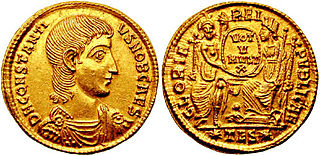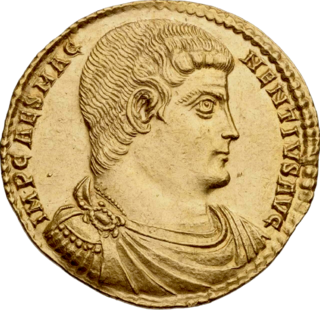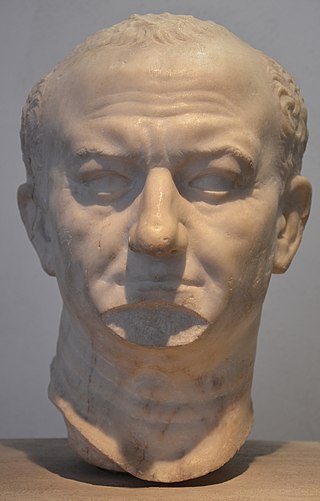Related Research Articles

Constantius II was Roman emperor from 337 to 361. His reign saw constant warfare on the borders against the Sasanian Empire and Germanic peoples, while internally the Roman Empire went through repeated civil wars, court intrigues, and usurpations. His religious policies inflamed domestic conflicts that would continue after his death.

Year 351 (CCCLI) was a common year starting on Tuesday of the Julian calendar. At the time, it was known in Rome as the Year of the Consulship of Magnentius and Gaiso. The denomination 351 for this year has been used since the early medieval period, when the Anno Domini calendar era became the prevalent method in Europe for naming years.

Magnus Magnentius was a Roman general and usurper against Constantius II. Of Germanic descent, Magnentius served with distinction in Gaul under the emperor Constans. On 18 January 350 Magnentius was acclaimed Augustus. Quickly killing the unpopular Constans, Magnentius gained control over most of the Western Empire. The Eastern emperor Constantius II, the brother of Constans, refused to acknowledge Magnentius' legitimacy and led a successful campaign against Magnentius. Ultimately, Magnentius' forces were scattered after the Battle of Mons Seleucus, and he died by suicide on 10 August 353.

Flavius Claudius Constantius Gallus was a statesman and ruler in the eastern provinces of the Roman Empire from 351 to 354, as Caesar under emperor Constantius II, his cousin. A grandson of emperor Constantius Chlorus and empress Flavia Maximiana Theodora, and a son of Julius Constantius and Galla, he belonged to the Constantinian dynasty. Born during the reign of his uncle Constantine the Great, he was among the few male members of the imperial family to survive the purge that followed Constantine's death. Under Constantius II, Gallus served as deputy emperor, based in Antioch and married to Constantius' sister Constantina. He dealt with a Jewish revolt in the years 351-352. Gallus ultimately fell out of favor with Constantius and was executed, being replaced as Caesar by his younger half-brother Julian.

The gens Flavia was a plebeian family at ancient Rome. Its members are first mentioned during the last three centuries of the Republic. The first of the Flavii to achieve prominence was Marcus Flavius, tribune of the plebs in 327 and 323 BC; however, no Flavius attained the consulship until Gaius Flavius Fimbria in 104 BC. The gens became illustrious during the first century AD, when the family of the Flavii Sabini claimed the imperial dignity.
Flavius Julius Constantius was a member of the Constantinian dynasty, being a son of Emperor Constantius Chlorus and his wife Flavia Maximiana Theodora, a younger half-brother of Emperor Constantine the Great and the father of Emperor Julian.
Justina was a Roman empress. She was initially the wife of the rebel emperor Magnentius and was then married to Valentinian I, with whom she had four children, including the emperor Valentinian II and the empress Galla.

Flavia Valeria Constantina, later known as Saint Constance, was the eldest daughter of Roman emperor Constantine the Great and his second wife Fausta, daughter of Emperor Maximian. Constantina may have received the title of Augusta from her father, and is venerated as a saint, having developed a medieval legend wildly at variance with what is known of her actual character.
Barbatio was a Roman general of the infantry under the command of Constantius II. Previously he was a commander of the household troops under Gallus Caesar, but he arrested Gallus under the instruction of Constantius, thereby ensuring his promotion on the death of Claudius Silvanus. In 359, both he and his wife Assyria were arrested and beheaded for treason against Constantius, possibly as part of a plot by Arbitio, a senior cavalry commander, and another exponent of the forms of scheming and political intrigue that became such a part of the later Roman Empire.
Clodius Celsinus Adelphius or Adelfius was a politician of the Roman Empire.
A daughter of Julius Constantius, of unknown name, was the first wife of Constantius II.
Eusebius was a high-ranking officer of the Roman Empire, holding the position of praepositus sacri cubiculi during the rule of Emperor Constantius II (337-361).
Censorius Datianus was a politician of the Roman Empire, very influential under the rule of Emperor Constantius II (337-361).
Vulcacius Rufinus was a Roman politician, related to the Constantinian dynasty.
Galla was the first known wife of Julius Constantius, a member of the Constantinian dynasty.
Basilina was the wife of Julius Constantius and the mother of the Roman emperor Julian who in her honour gave the name Basilinopolis to a city in Bithynia.
Calliopius was a Greek rhetor and official of the Roman Empire.
Agilo was an Alemannic warrior who served multiple Roman emperors in the 4th century. Originally tribunus stabuli (354) and then tribunus gentilium et scutariorum (354–360), he was promoted to magister peditum (360–362). Under Constantius II he was sent to protect the frontier on the Tigris, while Julian appointed him to the Commission of Chalcedon but passed him over for military service. In 365 the usurper Procopius recruited Agilo to his cause; Agilo eventually defected to the legitimate emperor Valens in 366.
Lucillianus was a high-ranking Roman army officer and father-in-law of the emperor Jovian. He fought with success in the war against Persia, and played a part in the execution of the emperor Constantius II's cousin, Gallus. In 361, Lucillianus was kidnapped by the emperor Julian and forced into retirement. He was recalled to service after the accession of his son-in-law Jovian in 363, and given a senior military command, only to be murdered that same year by mutinous troops in Gaul.